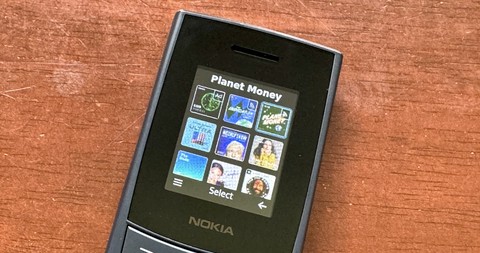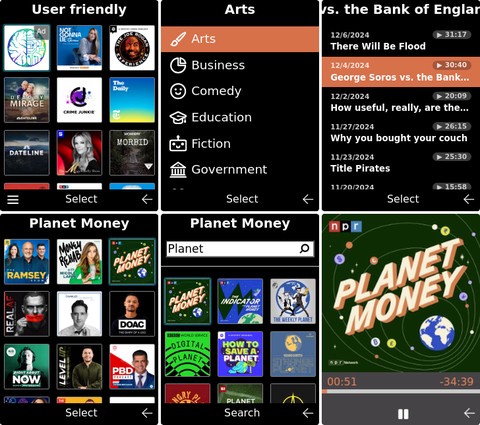
Launched in 2020, PodLP is the leading podcast app for feature phones available on KaiOS, the JioPhone, and now Cloud Phone. PodLP is on a mission to make the more than 4 million podcasts spanning education, news, sports, comedy, and religion available to listeners on flip phones around the world.
Early Cloud Phone Adoption
PodLP launched on Cloud Phone in June 2024, making it among the earliest third-party Cloud Phone widgets published. Testing was done on the Nokia 110 4G, one of the first phones that shipped with Cloud Phone. Even with years of experience on KaiOS, developing for QQVGA (128x160) screens proved to be quite a challenge.
Developer Experience
Compared to jailbreaking and sideloading apps via the Android Device Bridge (ADB), enabling developer mode on the Nokia 110 4G was beyond simple. Debugging, on the other hand, proved more difficult. There was no way access the console output or to make and test changes quickly.
Absent a debugger, RemoteJS proved to be a very useful tool. RemoteJS generates a UUID (i.e. 2f8e16e0-1b23-1c61-dacf-e1ca42df6927) that is appended as a data attribute to the <script> tag. As long as both the desktop browser and <script> tag use the same UUID, live console output is available as well as a terminal to execute JavaScript statements.
Growth & Adoption
In the 6 months after launch, PodLP has gained 13,500 unique users on Cloud Phone. Usage has grown steadily throughout that time as new devices continue to ship. One challenge continues to be analytics. Cloud Phone traffic originates from data centers in a few locations like Singapore and South Africa, and most content delivery networks (CDNs) and analytics services like Google Analytics do no support the X-Forwarded-For header. This makes it difficult to accurately track geographic information without deploying a custom GeoIP solution.
Great Support
Download attribution is important for podcast apps. It’s how podcast hosts know which apps to credit, and in turn, how podcasters know which apps their listeners use. On KaiOS, PodLP uses the userAgentInfo manifest property to ensure the User-Agent header on each HTTP request is “tagged” with a small identifier like PodLP/1.0.
Initially, Cloud Phone did not support appending a fragment to the User-Agent header. Since Cloud Phone is based on Chromium, the User-Agent header is a forbidden header that websites are not allowed to modify. Fortunately, the Cloud Phone team quickly responded to a feature request and added support for a custom user agent fragment!

Summary
Cloud Phone is a new, rapidly-growing platform to run web apps on feature phones. Since processing is done on powerful servers running Chromium, most websites and single page apps (SPAs) will run without issue. By far the most challenging part is designing for such small screens.
Contact Us
Contact Cloud Phone to learn how you can make your product available like PodLP on feature phones around the world
Get Support